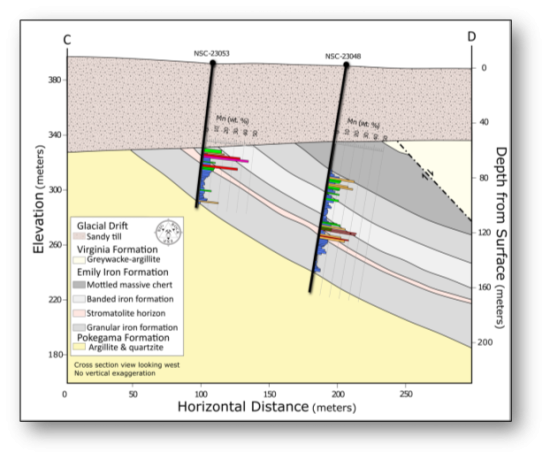Assay results from the final seven drill holes confirm that thick intersections of high-grade manganese extend along trend for more than 1,100 meters (3,609 feet), containing grades up to 46.3% Mn in individual samples. Results include1:
- 46.30% Mn (59.78% MnO) over 1.46 meters within 16.62% Mn over 20.60m
- 44.60% Mn (57.59% MnO) over 1.43 meters within 12.31% Mn over 32.46m
- 42.60% Mn (55.01% MnO) over 0.76 meters within 12.85% Mn over 64.68m
- 41.10% Mn (53.07% MnO) over 1.43 meters within 25.63% Mn over 5.61m
The drilling program has demonstrated excellent continuity of high-grade manganese, and mineralization has not been closed by drilling along trend or at depth.
Analytical data confirms that sulfur (S), which is assayed in every sample, is seldom above detection (0.001%).
Toronto, Ontario, 31st October 2023: Electric Metals (USA) Limited (“EML” or the “Company”) (TSXV: EML) (OTCQB: EMUSF) is pleased to announce the final assay results from the recent drilling program at the high-grade Emily Manganese Project (“Emily Project”), Minnesota, USA.
Previously reported results from the first twenty diamond drill holes of the program (refer announcements dated 27th June 2023, 13th July 2023, 24th August 2023 and 21st September 2023) described continuity of thick intervals of more than 30% manganese with a northerly dip and east-west strike direction.
New results reported in this announcement are for an additional seven drill holes located on 100-meter collar spacing (23047, 23048, 23049, 23050, 23052, 23053 and 23054) which confirm that high-grade, thick manganese intervals encompass at least 1,100 meters along an east-west trend (Table 1 and Figures 1-4) and show that the high-grade manganese oxide mineralization (manganite) has not been closed at depth or along trend.
New Assay Results
All seven drill holes intersected high-grade manganese with drilled intervals (approximate true thickness) of more than 20 meters (Table 1). Intervals with manganese contents of more than 44% Mn were intercepted in holes 23047, 23050 and 23053 however, all holes contain conspicuous intervals of more than 30% Mn within mineralized zones (5% Mn cut-off) of up to 64.68 meters thick. Importantly, the mineralization has excellent continuity in both thickness and tenure both along trend (Figure 2) and down down-dip (Figures 3 and 4).
Data Summary
Analytical data on quartered PQ sized drill core from the 27 completed diamond drill holes at Emily comprise a total of 2,156.6 meters (7,075.5 feet) of drill core (Table 2). Overlying rocks, host rock and underlying strata without visible mineralization were not sampled and uncut drill core from these intervals are kept on site for ongoing geology study. In total, 417 samples exceeded 10% Mn and these showed an average grade of 24% Mn which is largely contained within the dark grey to black manganese oxide mineral manganite (MnO(OH)).
Other major elements in the Mn mineralized rock include iron (Fe) and this ranges from 4.54% Fe to 51.99% Fe. Average iron content is the same for both the high Mn and low Mn sample groups (21.72% Fe) but the distribution shows a trend of lower Iron content in manganese samples with more that 25% Mn (Figure 5).
Quartz (SiO2) is the other main component of the mineralization and ranges up to 78.1% in the mineralized samples. Like Fe, there is a distinct decrease in quartz component with increasing manganese (Figure 5) and only a few samples with more than 25% Mn have greater SiO2 than Mn content. Typically, very high-grade Mn samples have low SiO2 content (Figure 6).
Copper, nickel and lead do not occur in the mineralization. Contents of these for each assayed interval are commonly less than detection (0.001%) and seldom more than 0.05%. Similarly, sulfur (S), also assayed for every sample, is seldom above detection (0.001%) and only ten samples (1.3% of analyses) contain more than 0.05% sulfur. There is unlikely to be concerns over metal contamination and acid generation from sulfides in any future development.
Figure 1. Location of drill holes 23047, 23054, 23048, 23053, 23049, 23052 and 23050 showing the project area, manganese host rock (Emily Iron Formation) and location of cross sections in Figures 2, 3 and 4.
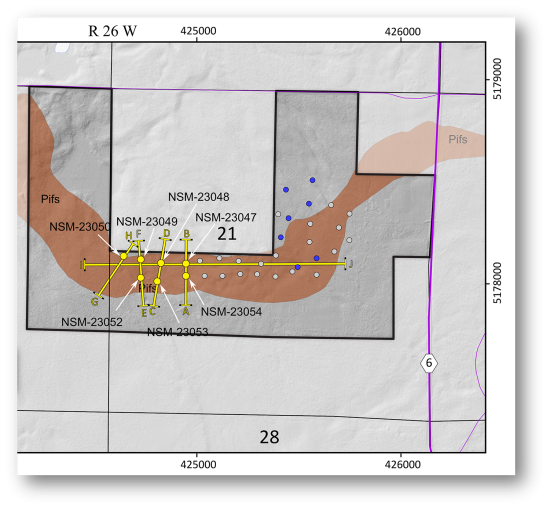
Figure 2. Long section I-J (refer Figure 1) showing drill hole traces of AC-02-11, 23001A, 23042, 23044, 23045, 23046A, 23047, 23048, 23049 and 23050, with manganese contents in assayed intervals and geology.

Figure 3A and 3B. Cross section A-B (refer Figure 1) upper (Figure 3A) showing drill hole traces of 23047 and 23054 and cross section C-D lower (Figure 3B) showing drill hole traces of 23048 and 23053 together with manganese contents in assayed intervals and geology.
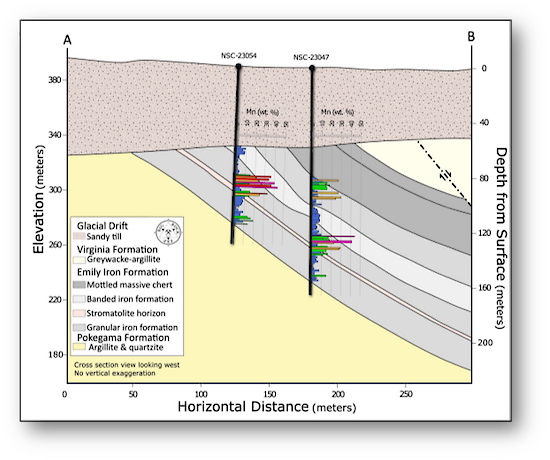
Figure 4A and 4B. Cross section E-F (refer Figure 1) upper (Figure 4A) showing drill hole traces of 23049 and 23052 and cross section G-H lower (Figure 4B) showing drill hole trace of 23050 together with manganese contents in assayed intervals and geology.
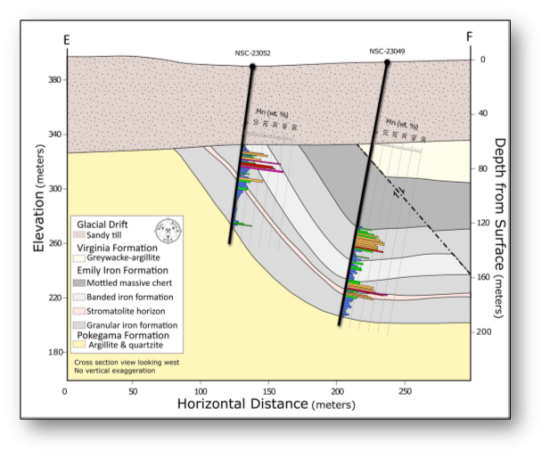
Table 1. Average assay data highlights for drill holes 23047, 23048, 23049, 23050, 23052, 23053 and 230542.

Table 2. Summary data for manganese mineralized samples in the 2023 Emily drilling program3.

Figure 5. Data plots of Mn% vs Fe% (left) and Mn% vs SiO2% (right) for 766 mineralized samples with Manganese contents more than 5% Mn.
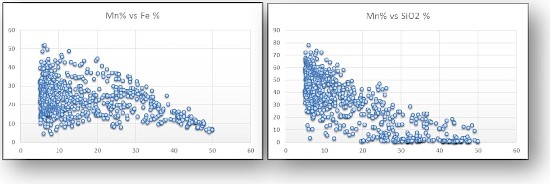
Typical mineralized drill core is shown in Figures 6, 7 and 8. These contain considerable differences in Mn:Fe and Mn:SiO2 ratios despite some similarities in manganese mineralogy and texture.
Metallurgical test work on composited samples collected from drill holes completed in the first part of the program is progressing at Kemetco Research Inc in Vancouver and results from this work will assist in manganese separation and concentration parameters of different ore types and ratios. Metallurgical investigations are expected to continue into 2024.
Geological Consultants, Big Rock Exploration have managed the drilling program and geology work and are currently near completion of a geological model for the deposit. Forte Dynamics Inc have commenced a NI43-101 resource update, and this is expected to be completed in late 2023.
Gary Lewis, Group CEO of EML commented on these final Emily results: “The thickness and grades of manganese have continued to the last drill hole, and we remain confident that we have substantially added to both the size and the average grade of the deposit.”
“The drilling program has been undertaken at the highest standard and achieved better outcomes than anticipated. I congratulate and thank our technical team, the drillers and all of the support crew who have worked tirelessly during the program.”
“We are now focused on advancing the metallurgical tests and finalizing a new NI 43-101 mineral resource estimate, which remains on track for delivery late this year. Environmental baseline data review and field studies are now underway and together with our social engagement programs, will form an important base for future project planning.”
“The strategic value of US-domiciled critical mineral projects such as the Emily Manganese Project has never been greater as the world transitions to clean energy and as domestic sources of supply becomes more important in an increasingly uncertain global landscape”.
Figure 6. High-grade manganese in drill hole 23057. Sample 798734 (91.4m to 92.17m; 299.9-302.4 feet) contains 44.0% Mn, 10.69% Fe and 0.79% SiO2.

Figure 7. Manganese mineralization in drill hole 23048. Sample 799254 (123.54m to 125.03m; 405.3-410.2 feet) contains 26.1% Mn, 26.57% Fe and 7.29% SiO2.
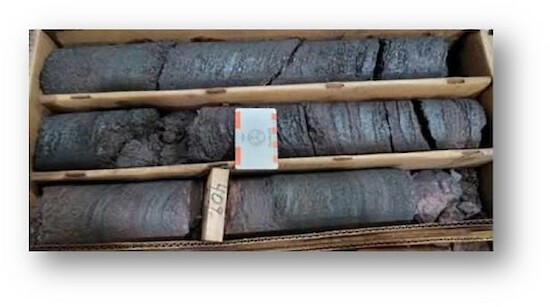
Figure 8. Manganese mineralization in drill hole 23047. Sample 799134 (129.84m to 130.55m; 426-428.3 feet) contains 16.1% Mn, 15.00% Fe and 48.6% SiO2.

Qualified Person
The scientific and technical data contained in this news release was reviewed and approved by Ian James Pringle PhD, who is a Qualified Person under National Instrument 43-101 Standards of Disclosure for Mineral Projects.
About Electric Metals (USA) Limited
Electric Metals (USA) Limited (TSXV: EML) (OTCQB: EMUSF) is a U.S.-based mineral development company with manganese and silver projects geared to supporting the transition to clean energy. The Company’s principal asset is the Emily Manganese Project in Minnesota, which has been the subject of considerable technical studies, including a National Instrument 43-101 Technical Report – Resource Estimate, with over US$26 million invested to date. The Company’s mission in Minnesota is to become a domestic U.S. producer of high-purity, high-value manganese metal and chemical products for supply to U.S. energy, technology and industrial markets. With manganese playing a critical and prominent role in lithium-ion battery formulations, and with no current domestic supply or active mines for manganese in North America, the development of the Emily Manganese Project represents a significant opportunity for America, the State of Minnesota and for the Company’s shareholders. In addition, the Company owns and operates the Corcoran Silver-Gold Project and the Belmont Silver Project in Nevada, with the former also having been the subject of a National Instrument 43-101 Technical Report – Resource Estimate.
Neither the TSX Venture Exchange nor its Regulation Services Provider (as that term is defined in the policies of the TSX Venture Exchange) accepts responsibility for the adequacy or accuracy of this release.
For further Information please contact:
Gary Lewis, Group CEO & Director: (647) 846 5299 - gl@electricmetals.com
Caution Regarding Forward-Looking Information
Certain statements contained in this news release constitute forward-looking information. These statements relate to future events or future performance. The use of any of the words "could", "intend", "expect", "believe", "will", "projected", "estimated" and similar expressions and statements relating to matters that are not historical facts are intended to identify forward-looking information and are based on EML's current belief or assumptions as to the outcome and timing of such future events. Actual future results may differ materially. In particular, this news release contains forward-looking information relating to, among other things, the development of the Company’s projects. Those assumptions and factors are based on information currently available to EML. Although such statements are based on reasonable assumptions of EML's management, there can be no assurance that any conclusions or forecasts will prove to be accurate.
While EML considers these statements to be reasonable based on information currently available, they may prove to be incorrect. Forward-looking information involves known and unknown risks, uncertainties and other factors which may cause the actual results, performance or achievements to be materially different from any future results, performance or achievements expressed or implied by the forward-looking information. Such factors include market risks and the demand for securities of the Company, risks inherent in the exploration and development of mineral deposits, including risks relating to changes in project parameters as plans continue to be redefined, risks relating to variations in grade or recovery rates, risks relating to changes in mineral prices and the worldwide demand for and supply of minerals, risks related to increased competition and current global financial conditions, access and supply risks, reliance on key personnel, operational risks, and regulatory risks, including risks relating to the acquisition of the necessary licenses and permits, financing, capitalization and liquidity risks.
The forward-looking information contained in this news release is made as of the date hereof, and EML is not obligated, and does not undertake, to update or revise any forward-looking information, whether as a result of new information, future events or otherwise, except as required by applicable securities laws. Because of the risks, uncertainties and assumptions contained herein, investors should not place undue reliance on forward-looking information. The foregoing statements expressly qualify any forward-looking information contained herein.
1 Drilled intervals shown are close to true thickness.
2 Assaying undertaken by ALS (Reno, NV) included a 23-element suite (ME-XRF21). High manganese samples (>25% Mn) were re-assayed using ME ICP81.
3 Assaying undertaken by ALS (Reno, NV) included a 23-element suite (ME-XRF21). High-grade manganese samples (>25% Mn) were re-assayed using ME ICP81.

